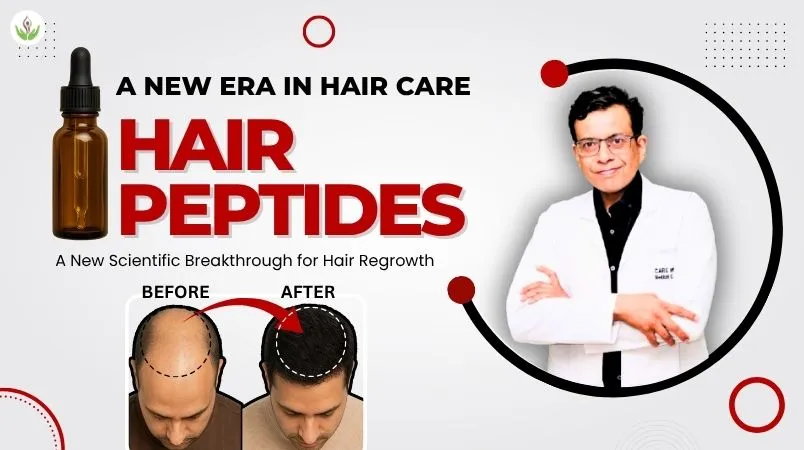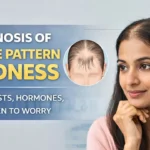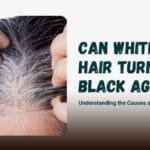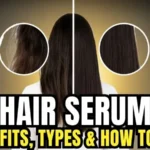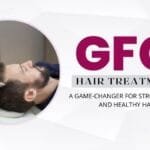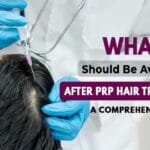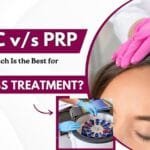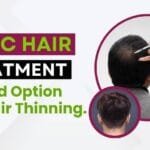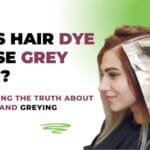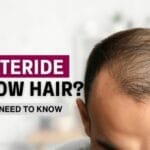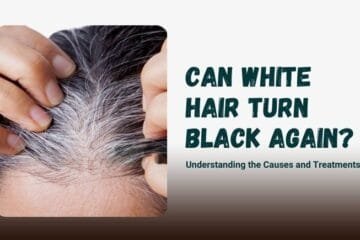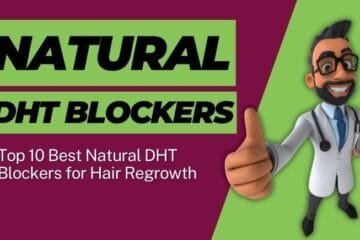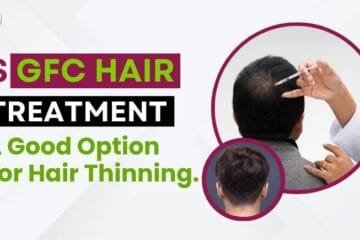Are you tired of seeing your hair grow thinner, even after trying every oil or supplement? At Care Well Medical Centre in Delhi, I have met many people who feel this same frustration. They spend months experimenting with products, hoping for a miracle. Yet, their confidence keeps fading as hair loss continues. That is why I believe Hair Peptides are a true scientific breakthrough in restoring natural hair growth. For advanced, science-based care, explore our Hair Loss Treatment in Delhi at Care Well Medical Centre.
That is why I believe Hair Peptides are a major breakthrough in modern hair restoration. These advanced, non-hormonal molecules repair damaged hair follicles from the root. Unlike Minoxidil or PRP, peptides work deep within the cells. They reactivate dormant follicles, strengthen the scalp, and support natural regrowth.
🎥 Watch my detailed explanation:
What Are Hair Peptides and How Do They Work?
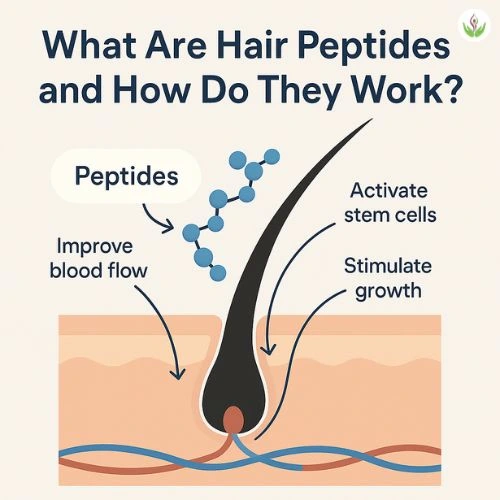
Many of my patients in Delhi visit me after trying everything — oils, serums, and several costly supplements. When I talk about hair peptides, they often ask a simple question: “Doctor, what are peptides, and how do they help hair grow again?”
I usually explain it like this. Hair peptides are tiny chains of amino acids — the same building blocks that make up proteins in our body. Their small size helps them travel deep into the scalp. They reach the dermal papilla, the living core of each follicle. That is where the real growth signals begin.
Inside the papilla, peptides act as gentle messengers. They wake dormant cells, improve blood flow, and restart the growth cycle. This process often slows down due to stress, hormonal changes, or inflammation.
At Care Well Medical Centre in South Delhi, peptide therapy supports regrowth in four key ways:
- It stimulates stem cells inside the follicle, helping them start producing new strands again.
- It improves micro-circulation by triggering angiogenesis. This brings more oxygen and nutrients to the roots.
- It reduces inflammation that silently damages follicles over time.
- It activates the Wnt/β-catenin pathway, a key biological switch that drives new follicle growth.
Unlike hormonal drugs or chemical tonics, peptide therapy for hair works with your body’s own healing system. It is gentle, scientific, and suitable for both men and women.
When I combine peptide therapy with microneedling or PRP, results often appear faster. Within a few months, patients start noticing stronger roots, reduced shedding, and a healthier scalp.
In essence, peptides remind the scalp how to grow hair again. The effect is natural and non-irritating.
💬 Personal Note
“For me, peptide therapy represents the shift from temporary fixes to true biological healing. It is science helping the body remember what it was always capable of.”
— Dr. Sandeep Bhasin, Cosmetic Surgeon, Delhi
Scientific Evidence Behind Hair Peptide Therapy
Many of my patients in Delhi ask, “Doctor, are hair peptides scientifically proven?” or “Are they safe for hair loss?” These are important questions. As a clinician, every treatment must stand on scientific research, not marketing claims.
Are Hair Peptides Scientifically Proven?
Yes, growing evidence supports the use of biomimetic peptides for promoting hair regrowth.
Research shows that peptides improve blood flow, activate stem cells, and repair follicles.
- A 2021 study in the Journal of Cosmetic Dermatology found that GHK-Cu (Copper Peptide) increased Vascular Endothelial Growth Factor (VEGF) and improved scalp microcirculation. This created a healthier environment for hair growth.
- Research from Yonsei University, Korea (2017) studied a peptide called PTD-DBM. It activates the Wnt/β-catenin pathway, which triggers new follicle formation. Mice treated with this peptide showed complete regrowth within four weeks.
- A 2024 randomized clinical study evaluated QR678 Neo®, a biomimetic peptide solution. It showed increased hair density and reduced shedding in patients with androgenetic alopecia.
- A 2020 review in the Journal of Applied Pharmaceutical Science reported that peptide-based formulations improved telogen effluvium and thinning hair without irritation or hormonal side effects. (JAPS, 2020;10(07):073-078).
Together, these studies show that hair peptides are safe, hormone-free, and active. They stimulate natural pathways, strengthen follicles, and support lasting results.
Are Hair Peptides Safe for Hair Loss?
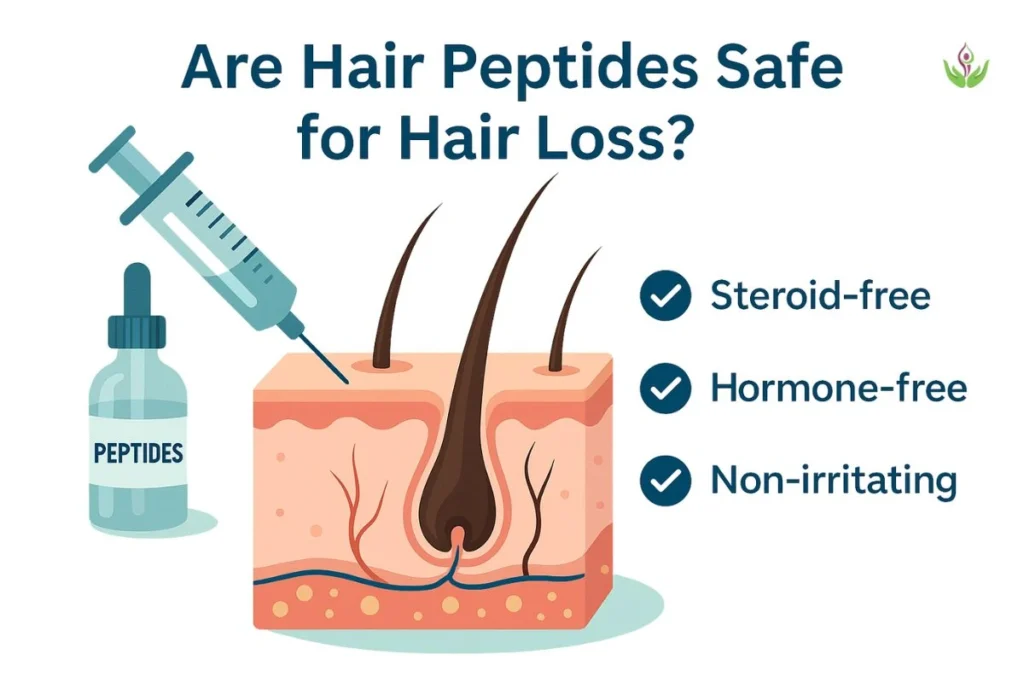
Peptides are among the safest modern treatments for both men and women with hair loss. They are steroid-free, hormone-free, and non-irritating. They do not interfere with testosterone or DHT levels.
Studies published on NCBI-PMC show that topical and injectable peptide therapies cause very few side effects compared to Minoxidil or Finasteride.
In my practice at Care Well Medical Centre, South Delhi, patients tolerate peptide therapy very well. Sometimes, a little redness may appear after microneedling, but it fades quickly. This reaction comes from the procedure, not the peptide itself.
Over time, I have seen the scalp become healthier, inflammation reduced, and roots grow stronger.
My Clinical Insight
From my years of practice, I have seen how peptide therapy has changed hair transplantation. It does not force the body to grow hair. Instead, it restores the follicle’s natural rhythm — enhancing blood flow, calming inflammation, and reawakening stem cells for steady regrowth.
“The goal is not to chase quick results but to restore biological balance. Peptides allow us to heal from the root — safely, scientifically, and sustainably.”
— Dr. Sandeep Bhasin, Cosmetic Surgeon, Delhi
Top Peptides for Hair Growth and Their Benefits
Over the years at Care Well Medical Centre, Delhi, I have worked with many patients who had almost given up on regaining their natural hair. What changed their journey was not another lotion or tablet — it was peptide therapy.
Each peptide works in a unique way. Some peptides improve blood flow and bring more nutrients to the roots. Others reduce scalp inflammation. A few also restart the stem cells that create new hair follicles. Let me walk you through the best hair peptides for hair growth and how I use them in my clinical protocols.
GHK-Copper Peptide (GHK-Cu)
Among all peptides, GHK-Cu remains my personal favourite for scalp rejuvenation. It is a small, natural tripeptide that binds to copper ions. This bond improves tissue repair and increases blood flow around the follicles.
When I use it in post-transplant or chronic thinning cases, I often see improved scalp tone and hair texture within six to eight weeks. Patients describe it as if their scalp “wakes up again.”
Mechanism of action:
- Increases VEGF (Vascular Endothelial Growth Factor) and angiogenesis.
- Enhances delivery of oxygen and nutrients to the dermal papilla.
- Stimulates collagen and keratin synthesis for thicker strands.
Referenced study:
GHK-Cu stimulates VEGF expression and hair follicle activity – J Cosmet Dermatol, 2021
Best for: Early thinning, post-transplant healing, and scalp ageing.
Thymosin Beta-4
I have seen great results with Thymosin Beta-4 in my patients with alopecia areata. This natural peptide helps cells move, supports tissue repair, and calms immune overactivity. It also reduces inflammation on the scalp.
How it helps:
- Promotes angiogenesis and stem-cell mobilisation.
- Reduces oxidative stress and inflammatory cytokines.
- Accelerates follicle healing after injury or PRP sessions.
When used as part of an injection protocol, it helps calm inflammatory patches and encourages uniform regrowth.
Referenced study:
Thymosin Beta-4 in wound healing and follicle repair – Ann N Y Acad Sci, 2012
Best for: Autoimmune-related hair loss, alopecia areata, and inflammatory scalp conditions.
Zinc Thymulin Peptide
Zinc Thymulin is a combination of the trace element zinc and the thymic hormone thymulin. Together, they help regulate the immune system and prolong the anagen (growth) phase of hair.
I often use this peptide in stress-related or immune-mediated hair fall. Patients notice reduced shedding and healthier scalp texture.
How it works:
- Supports cellular repair and scalp immunity.
- Regulates sebum and inflammation.
- Extends the active growth cycle.
Referenced study:
Zinc-Thymulin stimulates hair growth in murine models – Biofactors, 2013
Best for: Telogen effluvium and immune-linked shedding.
Procapil
Procapil combines biotinoyl tripeptide-1, oleanolic acid, and apigenin. It strengthens hair at the root and helps reduce DHT-related damage — naturally, without hormonal alteration.
Many of my male patients who are cautious about Finasteride respond very well to Procapil-based serums.
Benefits:
- Strengthens follicular anchoring.
- Improves scalp microcirculation.
- Reduces local 5-alpha-reductase activity.
Referenced study:
Evaluation of Procapil in androgenetic alopecia – J Clin Aesthet Dermatol, 2018
Best for: Androgenetic alopecia and hormonal hair thinning.
Capixyl
Capixyl is a patented complex of Acetyl Tetrapeptide-3 and red clover extract rich in biochanin A, a natural DHT inhibitor.
In my Delhi clinic, I often use Capixyl in combination with PRP or microneedling to enhance follicle anchoring and density.
Mode of action:
- Blocks DHT at follicle receptors.
- Improves extracellular matrix and bulb integrity.
- Reduces perifollicular inflammation.
Referenced study:
Capixyl peptide complex promotes follicle regeneration – Skin Pharmacol Physiol, 2019
Best for: Maintenance therapy and DHT-sensitive scalp types.
Redensyl
Redensyl has become one of the most trusted non-hormonal options for hair growth. It contains two active ingredients — dihydroquercetin-glucoside (DHQG) and EGCG-glucoside. These compounds activate the stem cells in the follicle’s bulge area. I often suggest Redensyl serums for patients who prefer topical treatments or are moving away from Minoxidil.
Benefits:
- Reactivates follicular stem cells.
- Promotes anagen phase entry.
- Increases hair density by up to 8–10 % in clinical trials.
Referenced study:
Clinical evaluation of Redensyl-based serum – Int J Trichology, 2017
Best for: Early-stage thinning, maintenance, and sensitive scalps.
Bycapil
Bycapil is a botanical complex derived from soy and wheat sprouts, enriched with amino acids and biotin. It improves keratin synthesis and cellular energy within the follicle. Bycapil works well for patients recovering from nutritional hair loss or chemical damage. It helps the hair regain its natural shine and strength.
Mechanism:
- Enhances mitochondrial ATP production.
- Extends the anagen phase.
- Strengthens keratin bonds and hair shaft quality.
Referenced study:
Effect of Bycapil blend on keratin expression – J Cosmet Sci, 2016
Best for: Nutrient-deficient hair, dull or brittle strands, and post-transplant recovery.
My Professional Insight
Each peptide has its own role, but the best results come when they are combined wisely. For example, GHK-Cu with Thymosin Beta-4 supports blood flow and immune repair. Adding Capixyl or Procapil helps maintain long-term hair density.
No two scalps are the same. My goal is always to create a plan that heals every layer — improves circulation, reduces inflammation, and reactivates stem cells. Peptides help me achieve this with precision.
In my experience, peptide therapy has helped many people regain both hair and confidence. It works through science, patience, and care.
Hair Peptides vs Minoxidil – Which Is Better?
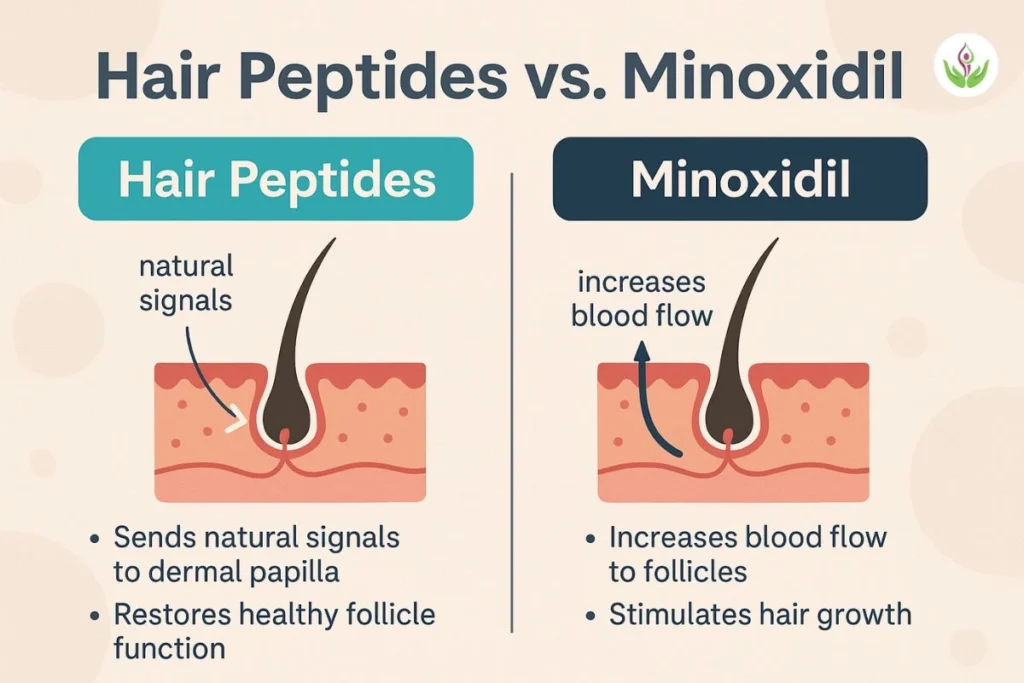
Almost every week, I meet patients in my Delhi clinic who ask, “Doctor, which is better — Minoxidil or peptide therapy?”
It is an important question because both treatments aim for the same goal: stronger, thicker hair. But the way they work — and the kind of results they create — are very different.
Minoxidil works by widening the blood vessels in the scalp. This increases circulation and forces hair follicles into the growth phase. It may help at first. But it does not treat inflammation, stem-cell fatigue, or follicle damage. These are the real reasons behind long-term thinning.
Peptides, on the other hand, work much deeper. They send natural signals to the dermal papilla cells. These signals wake up inactive stem cells and trigger the VEGF and Wnt/β-catenin pathways. Together, they help restore healthy hair follicle function. In simple terms, Minoxidil pushes hair to grow. Peptides remind the scalp how to grow hair again.
What I See in My Patients
From my experience at Care Well Medical Centre in South Delhi, many patients using Minoxidil face side effects. They often report scalp irritation, dryness, and temporary hair shedding in the beginning. Peptide therapy rarely causes any of this.
Most people report calmer scalps, stronger roots, and steady improvement without side effects.
When patients eventually stop Minoxidil, hair fall usually returns within weeks. With peptides, results usually last longer. This happens because they repair the hair follicle instead of giving it a temporary boost.
Peptides vs Minoxidil – Clinical Comparison
| Feature | Peptides | Minoxidil |
| Shedding | None | Initial shedding common |
| Irritation | Very rare | Itching and dryness frequent |
| Mechanism | Cellular signaling, stem-cell activation | Vasodilation (increased blood flow) |
| Results After Stop | Usually sustained | Often reversed |
| Safety | Hormone-free, suitable for all scalp types | Not suitable for sensitive skin |
I still use Minoxidil when it suits a patient’s condition. But for those who want a non-hormonal, gentle, and lasting solution, peptide therapy works better. It heals the environment where hair grows — something a chemical stimulant cannot do.
Over time, I have learned that the most successful treatment is not the one that forces fast results but the one that restores balance. When the scalp heals, hair grows naturally, beautifully, and stays.
Best Ways to Use Hair Peptides for Maximum Results
One of the first questions I hear from my patients is, “Doctor, how should I use hair peptides to get the best results?”
In my experience at Care Well Medical Centre in South Delhi, technique and consistency matter most. From what I have seen, peptides show their best and longest-lasting results in four key ways.
1. Topical Application – Your Daily Routine
For mild to moderate thinning, I recommend starting with a topical peptide serum. Apply to a clean, dry scalp twice daily. Use it in the morning and before bedtime.
Peptides like GHK-Cu, Redensyl, and Procapil work best when gently massaged into the scalp. This helps them absorb better and improves blood flow. Regular use is important. Most people see stronger, shinier hair and less shedding within eight to twelve weeks.
2. Microneedling – To Boost Absorption
In suitable cases, I pair peptide serums with microneedling to enhance penetration. This procedure uses fine needles to create controlled micro-channels on the scalp surface.
These tiny channels help the serum absorb better and activate natural healing. They also wake up dormant hair follicles. I often combine microneedling with GHK-Cu or Capixyl serums for patients who stop responding to PRP or Minoxidil. This synergy often restarts growth and improves density.
3. Mesotherapy – Precision Delivery Like PRP
For severe hair thinning, I use mesotherapy. It works much like PRP therapy. In this method, peptides are gently injected into the scalp’s upper layer. This places them close to the hair roots and papilla cells, where they can act directly.
This focused treatment speeds up recovery. It works especially well for patients healing after a hair transplant or dealing with patchy hair loss. Sessions are usually repeated every two to four weeks for best results.
4. LED Light Therapy and PRP Combination – The Synergy Effect
When peptides are used with PRP for hair loss or red LED therapy, results improve dramatically. PRP adds growth factors that start the repair process. Peptides help those effects last longer. LED light boosts oxygen and cell activity, helping the scalp heal faster and more evenly.
In my practice, peptides with PRP and LED give natural and lasting regrowth.
Personal Advice from My Practice
Every patient’s scalp behaves differently, which is why there is never a one-size-fits-all approach.
If you are new to peptides, begin with topical use. Once your scalp adjusts, we can gradually add microneedling or mesotherapy for stronger results. Within three months, most patients notice healthier roots and a calmer, revitalized scalp.
If you are based in or around Delhi, I would be happy to guide you through a personalized treatment plan that fits your unique condition.
💡 Consult Dr. Sandeep Bhasin for customized peptide-based hair therapy in Delhi.
Every scalp has its own rhythm — peptides simply help restore that rhythm naturally, so your hair can thrive again.
Peptides That Target Specific Conditions
In my clinical practice at Care Well Medical Centre, Delhi, I have seen that not all hair loss is the same. Some patients come after a transplant and need faster regrowth. Others face patchy hair fall after stress, or struggle with autoimmune causes like alopecia areata.
Doctors tailor peptide therapy to each condition. They use specific peptides to target the root cause of hair loss, unlike regular tonics or shampoos.
1. Post-Transplant Regrowth and Recovery
After a hair transplant, the scalp goes through an intense healing phase. Grafts need oxygen, nutrients, and cellular energy to survive.
Peptides like GHK-Cu and Thymosin Beta-4 are invaluable during this time. They increase blood circulation, improve graft survival, and accelerate wound healing.
I usually start these serums within two weeks after surgery to help the scalp recover faster and support uniform regrowth.
Patients often tell me that their transplanted hair grows in earlier and looks stronger when peptides are part of their post-op care.
2. Beard and Eyebrow Growth
Peptides are not limited to scalp treatments. Many young men visit for beard enhancement. Some women come to improve eyebrow density after over-plucking or hormonal changes.
Topical serums containing Redensyl and Procapil help stimulate follicles in these smaller areas.
When used regularly, they awaken dormant follicles and improve texture without causing irritation.
Results appear in two to three months. The beard looks thicker and well shaped. The eyebrows look fuller. The process is natural and safe.
3. Stress-Induced Hair Loss (Telogen Effluvium)
Modern stress often causes telogen effluvium and pushes follicles into rest. Peptides like Zinc Thymulin and Bycapil help restore the natural growth cycle.
I often combine these with mild microneedling or PRP to restore balance. Within a few months, most patients notice reduced shedding and improved density.
4. Alopecia Areata and Hormonal Imbalance
In autoimmune or hormone-related hair loss, Thymosin Beta-4 and Capixyl offer exceptional benefits.
They calm inflammation, improve blood flow, and strengthen the hair follicle structure from within.
Unlike steroids or hormonal drugs, peptides act gently. They calm the triggers without disturbing hormonal balance.
In PCOS or post-pregnancy hair loss, these peptides gently restore scalp balance. They also support steady, natural regrowth.
5. Safe for Younger Patients
Many teenagers and young adults hesitate to start hormonal or chemical-based treatments.
For them, peptides provide a completely safe, non-hormonal alternative. They can be used without fear of side effects or dependency.
From my experience, starting peptide therapy early helps slow hair thinning. It also keeps the scalp healthy for many years.
Hair loss has many causes, such as stress, illness, or surgery. But the goal is always the same — to help the scalp grow hair naturally. With the right peptides, we can treat the root cause safely and without hormones.
Hair loss may have many causes — from stress to surgery — but the goal remains the same: restore the scalp’s ability to grow hair naturally.
With the right selection of peptides, we can address every cause at its root — safely, effectively, and without hormonal interference.
💡 Visit Dr. Sandeep Bhasin at Care Well Medical Centre, Delhi. He will guide you on the best peptide treatment for your specific hair concern.
Emerging Innovations – PTD-DBM Peptide and Valproic Acid Combo
Science is moving beyond old serums. New peptides can restart hair growth at the genetic level, safely and effectively. I have closely followed the PTD-DBM peptide with Valproic acid. This combination helps rebuild hair follicles safely and naturally from within.
PTD-DBM and the Wnt/β-Catenin Pathway
Research from South Korea found that the PTD-DBM peptide activates the Wnt/β-catenin pathway. This pathway helps hair follicles repair and regrow naturally. In animal tests, it led to full hair growth within four weeks. No hormones or artificial stimulants were used.
What excites me most is its natural healing power. This peptide helps the scalp recover its ability to grow healthy hair again.
Valproic Acid – The Booster Molecule
Valproic acid, widely known in neurology, enhances the same β-catenin pathway by acting as a molecular “switch activator.”
When paired with peptides, it boosts cellular signals and speeds follicle recovery.
Early lab results show thicker regrowth even in resistant areas, hinting at a new horizon for peptide-based therapies.
Looking Ahead
This combination of PTD-DBM and Valproic acid may change how we treat hair loss. It shifts the focus from surface results to true biological repair and regeneration.
Top Hair Peptide Brands Available in India
Many patients visit my clinic asking, “Doctor, which is the best hair peptide serum in India?”
They have already tried countless oils and tonics, but few deliver real, lasting improvement.
Over the years, I have personally evaluated dozens of serums and medical-grade formulations. Only a handful consistently show visible results, with minimal irritation and strong clinical backing.
Let us look at the best hair peptide brands available in India, the ones I often recommend at Care Well Medical Centre, South Delhi.
1. Redz Mint Pro
This is a GHK-Cu peptide–based serum enriched with biotin and natural cofactors. It improves scalp circulation, oxygen flow, and follicle energy.
In my practice, I often prescribe it post-PRP or after a hair transplant for faster graft recovery.
Results: Patients usually report denser, shinier hair within six to eight weeks.
2. Adka Hair Peptide Serum
This lightweight serum blends amino acids with peptide chains that target scalp inflammation.
It works beautifully for stress-induced hair loss (telogen effluvium) and as maintenance therapy after microneedling.
Why I like it: It strengthens roots without leaving a greasy residue — ideal for daily application in humid cities like Delhi.
3. Redensyl Hair Serum
Redensyl is one of the most trusted names globally for non-hormonal regrowth. It activates stem cells in dormant follicles, extending the anagen (growth) phase naturally.
I recommend it for patients experiencing early-stage thinning, postpartum hair fall, or post-COVID shedding.
It often performs well for beard and eyebrow regrowth too.
4. Dermaco Hair Peptide Serum (18%)
This powerful 18% formulation delivers concentrated peptides along with vitamins and antioxidants.
It is ideal for diffuse thinning or for patients who wish to move away from Minoxidil-based products.
When used consistently, it improves hair volume, smoothness, and follicle density.
5. FCL Hair Stim Serum
Designed for men and women, FCL Hair Stim combines GHK-Cu and Thymulin peptides.
It is light, non-sticky, and clinically safe for sensitive scalps.
I find it especially useful for long-term scalp rejuvenation or for those with mild dandruff issues alongside hair fall.
6. SPL and IPCA Peptide Formulations
Both SPL and IPCA Laboratories manufacture pharmaceutical-grade peptide cocktails used in mesotherapy and clinical protocols.
These injectable blends are effective for post-transplant recovery and chronic thinning cases.
I often use them in combination with PRP or microneedling for enhanced follicle activation and repair.
Hair Peptide Cost in Delhi
At Care Well Medical Centre, hair peptide therapy in Delhi costs between ₹4,000 and ₹10,000 per session. Pricing varies by peptide type and delivery method: topical, microneedling, or mesotherapy.
For home maintenance, most good-quality serums cost ₹1,500 to ₹4,000 per bottle. Prices vary slightly based on concentration and brand composition.
Final Note from My Practice
The right peptide serum strengthens hair and heals the scalp from within.
When patients find a formula that suits their skin, they notice not just growth but also a sense of renewal.
If you are unsure which serum suits your condition, my advice is to start under medical guidance. Every scalp responds differently, and personalizing your routine ensures lasting results.
💡 Visit Dr. Sandeep Bhasin at Care Well Medical Centre, South Delhi. He offers personalized peptide treatments based on your hair type and medical needs.
Key Takeaways by Dr. Sandeep Bhasin
Over the years, I have treated many patients at Care Well Medical Centre. I have seen that peptide therapy gives safe and consistent results. It is one of the best and most balanced methods for hair restoration.
Here are the key lessons from my clinical experience:
- Safe for men, women, and teenagers — completely non-hormonal and well-tolerated across all age groups.
- Ideal alternative for those intolerant to Minoxidil — no dryness, itching, or dependency phase.
- Works synergistically with PRP and microneedling — accelerates recovery and enhances follicle activation.
- Promotes long-lasting, natural regrowth — helps maintain density without rebound shedding.
Over time, I have seen peptides restore both hair and self-esteem. True results come from healing the scalp, not forcing it.
Why Choose Peptide Therapy at Care Well Medical Centre, Delhi
Each scalp reacts differently. That is why I plan every peptide treatment with care. At Care Well Medical Centre, we use peptides, PRP, and nutrition to strengthen follicles. Delhi’s hard water and stress often worsen scalp problems. So, I always address these local causes for better and lasting results.
All our formulations are FDA-approved and used in a clean, sterile clinic. In South Delhi, we have helped many patients restore their hair and confidence safely.
📍 Address: Care Well Medical Centre, House No. 1, NRI Complex, C.R. Park, New Delhi – 110019
📞 Phone: 96679 77499
Conclusion
Hair restoration should feel natural, not forced. In my practice, hair peptides help the scalp stay balanced and healthy. They reduce hair fall and support natural regrowth without causing irritation or dependence. When treatment aligns with lifestyle, stress, and nutrition, results become consistent and long-lasting. It is not a quick fix. It is the restoration of your scalp’s natural ability to thrive.
Hair Peptide Therapy – Frequently Asked Questions (FAQs)
These are the questions my patients often ask during consultations. They want to understand how hair peptide therapy works at Care Well Medical Centre, Delhi.
Hair peptides wake up inactive follicles and improve blood flow to the scalp. They also help reduce inflammation and support healthy growth. They encourage natural regrowth without hormonal interference.
Yes, most clinically tested hair peptide serums are safe for daily use. They are non-hormonal, free from steroids, and suitable even for sensitive scalps.
Hair peptides can reactivate weak or dormant follicles, leading to visible regrowth in thinning areas. In advanced baldness, they work best when combined with PRP or microneedling.
Yes, peptides can be safely used with PRP, red light therapy, or even Minoxidil. These combinations often deliver faster and more sustainable results.
Most of my patients begin noticing reduced shedding and early regrowth within six to eight weeks of consistent use. Full results typically appear within three to four months.
Yes, peptide therapy is safe for both women and teenagers since it does not alter hormonal balance or cause systemic effects.
In my clinical experience, side effects are extremely rare. Some may experience mild scalp sensitivity initially, which usually settles within a few days.
Yes, absolutely. Peptides help transplanted grafts survive better. They also speed up healing and support faster hair growth after a transplant.
Results differ based on each scalp’s condition. In my practice, formulas with GHK-Cu, Thymulin, or Redensyl show the best and most consistent results.

